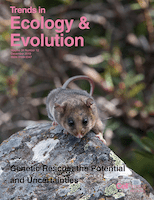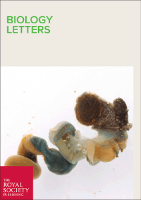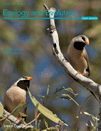
EVOLUTIONARY ECOLOGY
metrics 2024
Illuminating Biodiversity Through Evolutionary Perspectives
Introduction
EVOLUTIONARY ECOLOGY is a prestigious academic journal published by SPRINGER, exploring the intricate relationships between evolutionary processes and ecological dynamics since its inception in 1987. As a key resource in the field of Ecology, Evolution, Behavior, and Systematics, the journal is recognized for its impactful contributions, holding a commendable Q2 quartile ranking in its category as of 2023. With an emphasis on empirical and theoretical studies that bridge evolutionary biology with ecological principles, EVOLUTIONARY ECOLOGY is essential for researchers, practitioners, and students aiming to deepen their understanding of biodiversity, adaptation, and ecosystem functioning. Although it currently does not offer open access, the journal maintains a commitment to disseminating high-quality research that influences both foundational knowledge and practical applications in the field. Located in the Netherlands, the journal continues to serve a global audience, making significant contributions to advancing ecological and evolutionary research through rigorous scientific discourse and innovation.
Metrics 2024
 0.61
0.61 1.80
1.80 1.80
1.80 94
94Metrics History
Rank 2024
Scopus
IF (Web Of Science)
JCI (Web Of Science)
Quartile History
Similar Journals

Molecular Ecology Resources
Fostering Excellence in Molecular Ecology ResearchMolecular Ecology Resources, published by WILEY, is a leading international journal that specializes in the intersection of molecular biology with ecology and evolution. With an impressive impact factor signified by its Q1 status in multiple categories, including Biotechnology, Ecology, Evolution, Behavior and Systematics, and Genetics for 2023, this journal stands as a reputable source of groundbreaking research within the fields of agricultural and biological sciences. Its Scopus rankings are particularly noteworthy, placing it in the top tier of its respective categories, demonstrating its significance in advancing our understanding of molecular ecology. The journal has been committed to fostering high-quality scientific discourse from 2008 to 2024 and offers open access options to enhance its visibility and accessibility. As a researcher, professional, or student in these dynamic fields, engaging with Molecular Ecology Resources means contributing to and staying informed about the latest innovations and methodologies that shape our understanding of the biological world.

BEHAVIORAL ECOLOGY AND SOCIOBIOLOGY
Unraveling the Complex Tapestry of Ecology and SociobiologyBehavioral Ecology and Sociobiology is a peer-reviewed journal published by Springer, focusing on the nuanced interactions between animal behavior and ecological factors. With an impressive history dating back to 1976, the journal has made significant contributions to the field, maintaining a prominent position in the top quartile (Q1) for both Animal Science and Zoology, as well as Ecology, Evolution, Behavior, and Systematics, as of 2023. Its high Scopus rank underscores its influence, being recognized in the 79th percentile for Animal Science and the 68th percentile for Ecology. This journal serves as an essential platform for researchers, professionals, and students interested in exploring the evolutionary implications of social structures and behavioral traits in various species. Although it does not currently operate under an open-access model, its rigorous peer-review process ensures that published studies meet high academic standards. With a vast array of innovative articles spanning decades, Behavioral Ecology and Sociobiology remains a vital resource for advancing our understanding of the complex interplay between behavior and ecological dynamics.

Nature Ecology & Evolution
Fostering transformative ideas for a sustainable future.Nature Ecology & Evolution is a premier journal that serves as a cornerstone for cutting-edge research in the dynamic fields of ecology, evolution, behavior, and systematics. Published by NATURE PORTFOLIO, this journal, with the ISSN 2397-334X, emphasizes high-quality, impactful studies that advance our understanding of ecological interactions and evolutionary processes. With an impressive Scopus ranking placing it in the 99th percentile—#6 out of 721 in Ecology, Evolution, Behavior and Systematics and #5 out of 461 in Environmental Science Ecology—it is classified as a Q1 journal, highlighting its significance in the research community. Established in 2016, it continues to foster an open dialogue among researchers and practitioners while facilitating the dissemination of transformative ideas that shape environmental policy and conservation strategies. While access to articles is restricted, the journal's robust impact factor underscores its relevance in scholarly discourse. Researchers, professionals, and students are encouraged to engage with the current trends and discoveries published in this leading journal, which thrives on addressing the challenges and complexities of our natural world.

Journal of Vertebrate Biology
Championing high-quality research in zoology.Journal of Vertebrate Biology, a reputable publication established by the Institute of Vertebrate Biology in the Czech Republic, serves as a vital platform for research across the fields of Animal Science and Zoology, Aquatic Science, and Ecology, Evolution, Behavior and Systematics. With its ISSN 2694-7684 and a commendable 2023 Q2 ranking in multiple categories, this open-access journal embraces innovative scientific inquiry and fosters academic discourse. The journal's commitment to disseminating high-quality research is reflected in its Scopus rankings, positioning it within the top quartile in several impactful areas. As it continues to converge its focus until 2024, researchers, professionals, and students alike are encouraged to engage with cutting-edge studies that advance our understanding of vertebrate biology. This publication stands out not only in its scholarly contributions but also in enhancing global awareness of biodiversity and conservation issues.

TRENDS IN ECOLOGY & EVOLUTION
Illuminating Pathways in Ecological and Evolutionary StudiesTRENDS IN ECOLOGY & EVOLUTION, published by CELL PRESS, is a premier academic journal dedicated to the dynamic fields of ecology, evolution, and behavior. With its ISSN 0169-5347 and E-ISSN 1872-8383, this prestigious journal has consistently contributed to the scientific community since its inception in 1986 and is set to continue its legacy through 2024. Ranked in the top quartile (Q1) of its category in 2023, TRENDS IN ECOLOGY & EVOLUTION holds an extraordinary position, sitting at rank #4 out of 721 in the Scopus database for Agricultural and Biological Sciences, specifically within the Ecology and Evolution sectors, reflecting its high impact and relevance in these critical areas of study. The journal's objective is to provide a platform for reviewing and synthesizing the latest research, trends, and advances, thereby influencing the direction of future scientific inquiries. Although it does not currently offer open access options, its insights are invaluable for researchers, professionals, and students eager to delve into the rapidly evolving understanding of ecological and evolutionary processes.

JOURNAL OF MOLECULAR EVOLUTION
Exploring the Nexus of Molecular Mechanisms and EvolutionThe Journal of Molecular Evolution, published by Springer, is a prestigious peer-reviewed journal dedicated to advancing the understanding of molecular evolution through high-quality research and analysis. With an impact factor establishing it as a leading authority in the field, this journal provides a vital platform for scholars focused on the intricate relationships between molecular biology and evolutionary processes. Featuring a Q1 ranking in Ecology, Evolution, Behavior and Systematics, and significant rankings in Genetics and Molecular Biology, the journal has consistently positioned itself at the forefront of academic discourse since its inception in 1971. Notably, the journal boasts an extensive archive that converges from 1971 to 2024, providing a comprehensive resource for current and future research. Although it operates on a subscription model, the high caliber of contributions ensures that it remains an essential reference point for researchers, professionals, and advanced students eager to deepen their understanding of molecular mechanisms and evolutionary dynamics.

Biology Letters
Innovating the intersection of biology and interdisciplinary research.Biology Letters, published by the esteemed Royal Society, stands at the forefront of research in the field of biological sciences, with a strong emphasis on innovative studies that bridge gaps across disciplines. Since its inception in 2005, the journal has garnered significant recognition, achieving a remarkable Q1 ranking in Agricultural and Biological Sciences (miscellaneous) and a percentile of 88th in the same category, according to Scopus rankings. Released in the United Kingdom, the journal offers a platform for authors to share concise research findings and theoretical perspectives that contribute meaningfully to the advancement of biological inquiry. Although not open access, the journal remains highly regarded in the academic community for its rigorous peer-review process and impactful content, making it an invaluable resource for researchers, professionals, and students dedicated to exploring the complexities of biology. With an ongoing commitment to excellence, Biology Letters continues to shape the future of biological sciences.

Ecology and Evolution
Unlocking the secrets of nature's intricate web.Ecology and Evolution is a leading open-access journal published by WILEY, dedicated to advancing knowledge in the fields of ecology, evolution, and behavior. Since its inception in 2011, the journal has established itself as a critical platform, garnering a significant impact factor and maintaining a prestigious Q1 ranking in multiple categories, including Ecology, Evolution, Behavior and Systematics, and Nature and Landscape Conservation as of 2023. With its continuous commitment to high-quality research, Ecology and Evolution provides a vital conduit for dissemination among researchers, professionals, and students alike. The journal's open-access model ensures that groundbreaking findings are accessible to a global audience, fostering collaboration and innovation across various ecological and evolutionary disciplines. The editorial team invites submissions that explore the intricate relationships between organisms and their environments, aiming to inspire future research that addresses pressing environmental challenges. The journal's rigorous peer-review process guarantees the integrity and quality of published work, reinforcing its position as a frontrunner in its field.

Annual Review of Ecology Evolution and Systematics
Championing Rigorous Scholarship in Ecology and EvolutionThe Annual Review of Ecology, Evolution, and Systematics, published by Annual Reviews, is a leading academic journal dedicated to advancing the understanding of ecological and evolutionary processes. With a commendable impact factor and impressive rankings—9th in both the Ecology, Evolution, Behavior and Systematics category and the Environmental Science category—this journal is recognized for its rigorous peer-reviewed articles that synthesize research findings across a wide range of topics within the fields of ecology and evolutionary biology. Established in 2003, this annual publication aims to provide researchers, professionals, and students with comprehensive insights into the latest developments and trends within these dynamic disciplines. By facilitating access to high-quality scholarly articles, the Annual Review of Ecology, Evolution, and Systematics continues to play a crucial role in fostering scientific discourse and discovery.

JOURNAL OF EVOLUTIONARY BIOLOGY
Advancing the Frontiers of Evolutionary ScienceJOURNAL OF EVOLUTIONARY BIOLOGY, published by Wiley, is a prestigious, peer-reviewed journal that has served as a key platform for groundbreaking research in the field of evolutionary biology since its inception in 1988. With its remarkable Q1 status in the 2023 category of Ecology, Evolution, Behavior, and Systematics, the journal is recognized for its high-quality contributions and impactful findings, currently ranking 203 out of 721 in its category on Scopus, placing it in the 71st percentile. The journal covers a wide scope of topics, fostering discussions that advance our understanding of evolutionary processes and their applications, which is critical for researchers, academics, and students alike. While it does not offer Open Access options, subscribers can benefit from articles that explore diverse aspects of evolution and biodiversity. As the journal continues to evolve, it remains an essential resource for those keen on exploring the mechanisms of life’s diversity and adaptation.